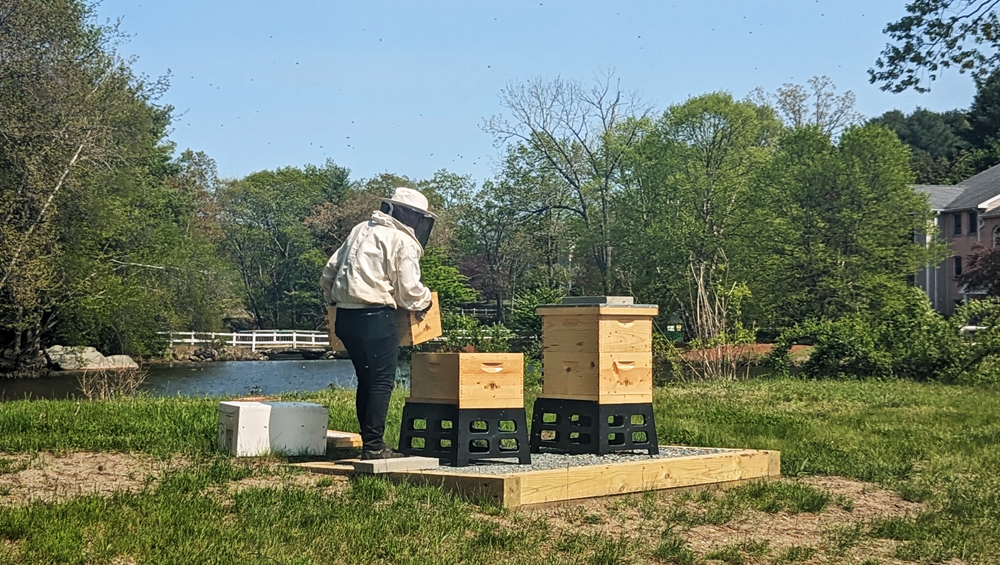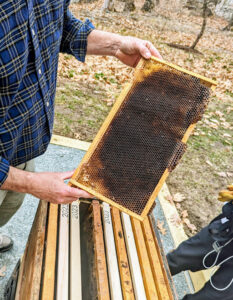Waterfall Hills welcomes new ‘tenants’ through Nature Positive Initiative
By Candace Paris
An employee of The Best Bees Co. installs the new beehives at Waterfall Hills. (Photo courtesy of Chloe Hundertmark)
Some new residents moved in this spring at the Waterfall Hills apartment complex off Bolivar Street. They have no lease nor do they pay any rent in the usual sense despite living in specialized housing. That’s because these new Cantonites are honeybees.
Part of a new initiative by Waterfall Hills’ parent company, Chestnut Hill Realty (CHR), the bees live in two hives up a steep slope and roughly 20 feet away from the edge of a small parking lot on one side and close to the pond that feeds the waterfall on the other side. Two signs caution passersby against disturbing the bees or coming closer than 10 feet.
The bees owe their presence at Waterfall Hills to Ed Zuker, the founder, owner and CEO of Chestnut Hill Realty. Zuker, a Brookline resident who has a passion for the environment dating back many years, said that CHR has always been environmentally involved, promoting energy efficiency where possible through the use of low-flow fixtures, geothermal heating, recycling and EV charging stations. Its properties, scattered around greater Boston, feature fitness trails and often abut conservation land, as at Waterfall Hills. The Nature Positive Initiative is CHR’s newest push toward increasing ecosystem-conservation efforts.
Chloe Hundertmark is the company’s horticulture project administrator, a position newly created as part of the initiative. A member of the CHR Horticulture Department headed by Tim Dolan, she works with The Best Bees Company, the Boston-based firm that placed the beehives at Waterfall Hills and nine other CHR locations, including Norwood Gardens, and continues to monitor their health. The bees are Italian honey bees (Apis mellifera liguistica), which are known for being the most docile species.
While the bees will become defensive if attacked, they do tolerate some management. Since placing the CHR hives over several months starting in April, employees of the Best Bees Company have made service visits every three to five weeks to ensure populations remain steady and there is no sign of varroa mites, which threaten hive health by eating or deforming bee larvae. While some of the CHR hives have experienced reduced populations, Hundertmark said they have all rebounded; the Waterfall Hills hives have had only good reports.
Each hive contains an average of 50,000 to 60,000 bees. Most are female, non-queen worker bees and a few hundred to a thousand are male drone bees. Each hive also has one queen bee.
Besides safety for people and the hives, placement strategy considers sunlight exposure and directional considerations (south-facing is ideal) as well as bee-friendly plantings. To keep the bees happy and close to home, CHR has put in native plantings, creating pollinator gardens with butterfly bush, catmint (Nepeta), goldenrod, bee balm, and purple coneflower (Echinacea). A no-mow zone surrounding the hives both helps the plants and keeps CHR workers safe.
“With Waterfall Hills, we got very lucky,” Hundertmark said. “It’s an ideal site.” Proximity to the pond is another benefit — eliminating any need to provide a water source.
Zuker traced his interest in the environment back to two influences when he was a young man. He described how a friend who was a “surrogate grandfather” encouraged him to landscape the first rental property he had purchased. Zuker was skeptical but did so and noticed that afterward his tenants seemed to be happier, taking more pride in where they lived by cooperating better with trash placement, for example. The oil embargo of 1973, when fuel prices rose significantly (and availability was limited), was another influence. Zuker found that he was able to cut costs through energy conservation.
Now he’s passionate about helping bees. Referring to their importance in pollinating food crops, Zuker noted, “If we don’t have them, we’re in trouble.” Along with maintaining hives, CHR avoids the use of pesticides because of the association with colony collapse disorder. A serious threat to bee populations overall and somewhat mysterious, this phenomenon results when a hive is abandoned by most of its worker bees. Hundertmark said she doesn’t see this as a threat with CHR bees.
Zuker, Dolan and Hundertmark all noted the very positive responses to the program from residents and CHR employees. Direct benefits in the form of honey will soon be available. The Best Bees Company has begun collecting honey produced by the hives. It will then be processed, put into jars and delivered to property offices where residents can get some for a donation. The money raised will go to Urban Bee Lab, a nonprofit working on bee research and education.
Dolan noted that Zuker wants all CHR sites to have beehives and intends the project to be “ongoing, for many years.” Describing his own experience with the bee project, Zuker said, “It’s an education.” He is eager to involve tenants more in the learning as well.
As far as other projects, Zuker said there are possibilities but no specific future plans yet. “We’ll see how it goes,” he said. At a minimum, there will be careful monitoring, including DNA analysis of the honey to determine what plants bees are taking nectar from.
This fall, after most of the honey has been collected, the hives will be closed. Hundertmark explained that bees remain in the hive during the colder months, eating the remaining honey and resting while beating their wings to help maintain the hive at a steady 90 degrees. Next spring, the thousands of small tenants at Waterfall Hills will get busy producing honey (“rent”) and pollinating their Canton neighborhood plants.
Short URL: https://www.thecantoncitizen.com/?p=117833











